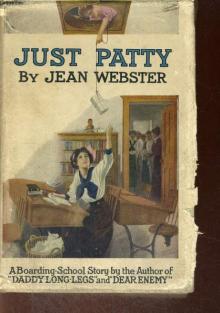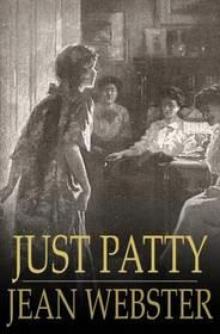- Home
- Jean Webster
Daddy-Long-Legs & Dear Enemy Page 3
Daddy-Long-Legs & Dear Enemy Read online
Page 3
Jerusha’s anxious frown gave place to quick laughter. She was by nature a sunny soul, and had always snatched the tiniest excuse to be amused. If one could derive any sort of entertainment out of the oppressive fact of a Trustee, it was something unexpected to the good. She advanced to the office quite cheered by the tiny episode, and presented a smiling face to Mrs. Lippett. To her surprise the matron was also, if not exactly smiling, at least appreciably affable; she wore an expression almost as pleasant as the one she donned for visitors.
“Sit down, Jerusha, I have something to say to you.”
Jerusha dropped into the nearest chair and waited with a touch of breathlessness. An automobile flashed past the window; Mrs. Lippett glanced after it.
“Did you notice the gentleman who has just gone?”
“I saw his back.”
“He is one of our most affluential Trustees, and has given large sums of money toward the asylum’s support. I am not at liberty to mention his name; he expressly stipulated that he was to remain unknown.”
Jerusha’s eyes widened slightly; she was not accustomed to being summoned to the office to discuss the eccentricities of Trustees with the matron.
“This gentleman has taken an interest in several of our boys. You remember Charles Benton and Henry Freize? They were both sent through college by Mr.—er—this Trustee, and both have repaid with hard work and success the money that was so generously expended. Other payment the gentleman does not wish. Heretofore his philanthropies have been directed solely toward the boys; I have never been able to interest him in the slightest degree in any of the girls in the institution, no matter how deserving. He does not, I may tell you, care for girls.”
“No, ma’am,” Jerusha murmured, since some reply seemed to be expected at this point.
“To-day at the regular meeting, the question of your future was brought up.”
Mrs. Lippett allowed a moment of silence to fall, then resumed in a slow, placid manner extremely trying to her hearer’s suddenly tightened nerves.
“Usually, as you know, the children are not kept after they are sixteen, but an exception was made in your case. You had finished our school at fourteen, and having done so well in your studies—not always, I must say, in your conduct—it was determined to let you go on in the village high school. Now you are finishing that, and of course the asylum cannot be responsible any longer for your support. As it is, you have had two years more than most.”
Mrs. Lippett overlooked the fact that Jerusha had worked hard for her board during those two years, that the convenience of the asylum had come first and her education second; that on days like the present she was kept at home to scrub.
“As I say, the question of your future was brought up and your record was discussed—thoroughly discussed.”
Mrs. Lippett brought accusing eyes to bear upon the prisoner in the dock, and the prisoner looked guilty because it seemed to be expected—not because she could remember any strikingly black pages in her record.
“Of course the usual disposition of one in your place would be to put you in a position where you could begin to work, but you have done well in school in certain branches; it seems that your work in English has even been brilliant. Miss Pritchard who is on our visiting committee is also on the school board; she has been talking with your rhetoric teacher, and made a speech in your favor. She also read aloud an essay that you had written entitled, ‘Blue Wednesday.’”
Jerusha’s guilty expression this time was not assumed.
“It seemed to me that you showed little gratitude in holding up to ridicule the institution that has done so much for you. Had you not managed to be funny I doubt if you would have been forgiven. But fortunately for you, Mr.——, that is, the gentleman who has just gone—appears to have an immoderate sense of humor. On the strength of that impertinent paper, he has offered to send you to college.”
“To college?” Jerusha’s eyes grew big.
Mrs. Lippett nodded.
“He waited to discuss the terms with me. They are unusual. The gentleman, I may say, is erratic. He believes that you have originality, and he is planning to educate you to become a writer.”
“A writer?” Jerusha’s mind was numbed. She could only repeat Mrs. Lippett’s words.
“That is his wish. Whether anything will come of it, the future will show. He is giving you a very liberal allowance, almost, for a girl who has never had any experience in taking care of money, too liberal. But he planned the matter in detail, and I did not feel free to make any suggestions. You are to remain here through the summer, and Miss Pritchard has kindly offered to superintend your outfit. Your board and tuition will be paid directly to the college, and you will receive in addition during the four years you are there, an allowance of thirty-five dollars a month. This will enable you to enter on the same standing as the other students. The money will be sent to you by the gentleman’s private secretary once a month, and in return, you will write a letter of acknowledgment once a month. That is—you are not to thank him for the money; he doesn’t care to have that mentioned, but you are to write a letter telling of the progress in your studies and the details of your daily life. Just such a letter as you would write to your parents if they were living.
“These letters will be addressed to Mr. John Smith and will be sent in care of the secretary. The gentleman’s name is not John Smith, but he prefers to remain unknown. To you he will never be anything but John Smith. His reason in requiring the letters is that he thinks nothing so fosters facility in literary expression as letter-writing. Since you have no family with whom to correspond, he desires you to write in this way; also, he wishes to keep track of your progress. He will never answer your letters, nor in the slightest particular take any notice of them. He detests letter-writing, and does not wish you to become a burden. If any point should ever arise where an answer would seem to be imperative—such as in the event of your being expelled, which I trust will not occur—you may correspond with Mr. Griggs, his secretary. These monthly letters are absolutely obligatory on your part; they are the only payment that Mr. Smith requires, so you must be as punctilious in sending them as though it were a bill that you were paying. I hope that they will always be respectful in tone and will reflect credit on your training. You must remember that you are writing to a Trustee of the John Grier Home.”
Jerusha’s eyes longingly sought the door. Her head was in a whirl of excitement, and she wished only to escape from Mrs. Lippett’s platitudes, and think. She rose and took a tentative step backwards. Mrs. Lippett detained her with a gesture; it was an oratorical opportunity not to be slighted.
“I trust that you are properly grateful for this very rare good fortune that has befallen you? Not many girls in your position ever have such an opportunity to rise in the world. You must always remember—”
“I—yes, ma’am, thank you. I think, if that’s all, I must go and sew a patch on Freddie Perkins’s trousers.”
The door closed behind her, and Mrs. Lippett watched it with dropped jaw, her peroration in mid-air.
THE LETTERS OF MISS JERUSHA ABBOTT to MR. DADDY-LONG-LEGS SMITH
215 FERGUSSEN HALL,
September 24th.
Dear Kind-Trustee-Who-Sends-Orphans-to-College,
Here I am! I traveled yesterday for four hours in a train. It’s a funny sensation isn’t it? I never rode in one before.
College is the biggest, most bewildering place—I get lost whenever I leave my room. I will write you a description later when I’m feeling less muddled; also I will tell you about my lessons. Classes don’t begin until Monday morning, and this is Saturday night. But I wanted to write a letter first just to get acquainted.
It seems queer to be writing letters to somebody you don’t know. It seems queer for me to be writing letters at all—I’ve never written more than three or four in my life, so please overlook it if these are not a model kind.
Before leaving yesterday morning, Mrs. Lippett and I had
a very serious talk. She told me how to behave all the rest of my life, and especially how to behave toward the kind gentleman who is doing so much for me. I must take care to be Very Respectful.
But how can one be very respectful to a person who wishes to be called John Smith? Why couldn’t you have picked out a name with a little personality? I might as well write letters to Dear Hitching-Post or Dear Clothes-Pole.
I have been thinking about you a great deal this summer; having somebody take an interest in me after all these years, makes me feel as though I had found a sort of family. It seems as though I belonged to somebody now, and it’s a very comfortable sensation. I must say, however, that when I think about you, my imagination has very little to work upon. There are just three things that I know:
I. You are tall.
II. You are rich.
III. You hate girls.
I suppose I might call you Dear Mr. Girl-Hater. Only that’s sort of insulting to me. Or Dear Mr. Rich-Man, but that’s insulting to you, as though money were the only important thing about you. Besides, being rich is such a very external quality. Maybe you won’t stay rich all your life; lots of very clever men get smashed up in Wall Street. But at least you will stay tall all your life! So I’ve decided to call you Dear Daddy-Long-Legs. I hope you won’t mind. It’s just a private pet name—we won’t tell Mrs. Lippett.
The ten o’clock bell is going to ring in two minutes. Our day is divided into sections by bells. We eat and sleep and study by bells. It’s very enlivening; I feel like a fire horse all of the time. There it goes! Lights out. Good night.
Observe with what precision I obey rules—due to my training in the John Grier Home.
Yours most respectfully,
JERUSHA ABBOTT.
To Mr. Daddy-Long-Legs Smith.
October 1st.
Dear Daddy-Long-Legs,
I love college and I love you for sending me—I’m very, very happy, and so excited every moment of the time that I can scarcely sleep. You can’t imagine how different it is from the John Grier Home. I never dreamed there was such a place in the world. I’m feeling sorry for everybody who isn’t a girl and who can’t come here; I am sure the college you attended when you were a boy couldn’t have been so nice.
My room is up in a tower that used to be the contagious ward before they built the new infirmary. There are three other girls on the same floor of the tower—a Senior who wears spectacles and is always asking us please to be a little more quiet, and two Freshmen named Sallie McBride and Julia Rutledge Pendleton. Sallie has red hair and a turned-up nose and is quite friendly; Julia comes from one of the first families in New York and hasn’t noticed me yet. They room together and the Senior and I have singles. Usually Freshmen can’t get singles; they are very scarce, but I got one without even asking. I suppose the registrar didn’t think it would be right to ask a properly brought-up girl to room with a foundling. You see there are advantages!
My room is on the northwest corner with two windows and a view. After you’ve lived in a ward for eighteen years with twenty room-mates, it is restful to be alone. This is the first chance I’ve ever had to get acquainted with Jerusha Abbott. I think I’m going to like her.
Do you think you are?
Tuesday.
They are organizing the Freshman basket-ball team and there’s just a chance that I shall make it. I’m little of course, but terribly quick and wiry and tough. While the others are hopping about in the air, I can dodge under their feet and grab the ball. It’s loads of fun practising—out in the athletic field in the afternoon with the trees all red and yellow and the air full of the smell of burning leaves, and everybody laughing and shouting. These are the happiest girls I ever saw—and I am the happiest of all!
I meant to write a long letter and tell you all the things I’m learning (Mrs. Lippett said you wanted to know) but 7th hour has just rung, and in ten minutes I’m due at the athletic field in gymnasium clothes. Don’t you hope I’ll make the team?
Yours always,
JERUSHA ABBOTT.
P.S. (9 o’clock)
Sallie McBride just poked her head in at my door. This is what she said:
“I’m so homesick that I simply can’t stand it. Do you feel that way?”
I smiled a little and said no, I thought I could pull through. At least homesickness is one disease that I’ve escaped! I never heard of anybody being asylumsick, did you?
October 10th.
Dear Daddy-Long-Legs,
Did you ever hear of Michael Angelo?1
He was a famous artist who lived in Italy in the Middle Ages. Everybody in English Literature seemed to know about him and the whole class laughed because I thought he was an archangel. He sounds like an archangel, doesn’t he? The trouble with college is that you are expected to know such a lot of things you’ve never learned. It’s very embarrassing at times. But now, when the girls talk about things that I never heard of, I just keep still and look them up in the encyclopedia.
I made an awful mistake the first day. Somebody mentioned Maurice Maeterlinck,2 and I asked if she was a Freshman. That joke has gone all over college. But anyway, I’m just as bright in class as any of the others—and brighter than some of them!
Do you care to know how I’ve furnished my room? It’s a symphony in brown and yellow. The wall was tinted buff, and I’ve bought yellow denim curtains and cushions and a mahogany desk (second hand for three dollars) and a rattan chair and a brown rug with an ink spot in the middle. I stand the chair over the spot.
The windows are up high; you can’t look out from an ordinary seat. But I unscrewed the looking-glass from the back of the bureau, upholstered the top, and moved it up against the window. It’s just the right height for a window seat. You pull out the drawers like steps and walk up. Very comfortable!
Sallie McBride helped me choose the things at the Senior auction. She has lived in a house all her life and knows about furnishing. You can’t imagine what fun it is to shop and pay with a real five-dollar bill and get some change—when you’ve never had more than a nickel in your life. I assure you, Daddy dear, I do appreciate that allowance.
Sallie is the most entertaining person in the world—and Julia Rutledge Pendleton the least so. It’s queer what a mixture the registrar can make in the matter of room-mates. Sallie thinks everything is funny—even flunking—and Julia is bored at everything. She never makes the slightest effort to be amiable. She believes that if you are a Pendleton, that fact alone admits you to heaven without any further examination. Julia and I were born to be enemies.
And now I suppose you’ve been waiting very impatiently to hear what I’m learning?
I. Latin: Second Punic war.3 Hannibal and his forces pitched camp at Lake Trasimenus last night. They prepared an ambuscade for the Romans, and a battle took place at the fourth watch this morning. Romans in retreat.
II. French: 24 pages of the “Three Musketeers”4 and third conjugation, irregular verbs.
III. Geometry: Finished cylinders; now doing cones.
IV. English: Studying exposition. My style improves daily in clearness and brevity.
V. Physiology: Reached the digestive system. Bile and the pancreas next time.
Yours, on the way
to being educated,
JERUSHA ABBOTT.
P.S. I hope you never touch alcohol, Daddy?
It does dreadful things to your liver.
Wednesday
Dear Daddy-Long-Legs,
I’ve changed my name.
I’m still “Jerusha” in the catalogue, but I’m “Judy” every place else. It’s sort of too bad, isn’t it, to have to give yourself the only pet name you ever had? I didn’t quite make up the Judy though. That’s what Freddie Perkins used to call me before he could talk plain.
I wish Mrs. Lippett would use a little more ingenuity about choosing babies’ names. She gets the last names out of the telephone book—you’ll find Abbott on the first page—and she picks the Christi
an names up anywhere; she got Jerusha from a tombstone. I’ve always hated it; but I rather like Judy. It’s such a silly name. It belongs to the kind of girl I’m not—a sweet little blue-eyed thing, petted and spoiled by all the family, who romps her way through life without any cares. Wouldn’t it be nice to be like that? Whatever faults I may have, no one can ever accuse me of having been spoiled by my family! But it’s sort of fun to pretend I’ve been. In the future please always address me as Judy.
Do you want to know something? I have three pairs of kid gloves. I’ve had kid mittens before from the Christmas tree, but never real kid gloves with five fingers. I take them out and try them on every little while. It’s all I can do not to wear them to classes.
(Dinner bell. Good-by.)
Friday.
What do you think, Daddy? The English instructor said that my last paper shows an unusual amount of originality. She did, truly. Those were her words. It doesn’t seem possible, does it, considering the eighteen years of training that I’ve had? The aim of the John Grier Home (as you doubtless know and heartily approve of) is to turn the ninety-seven orphans into ninety-seven twins.
The unusual artistic ability which I exhibit, was developed at an early age through drawing chalk pictures of Mrs. Lippett on the woodshed door.

 Daddy-Long-Legs & Dear Enemy
Daddy-Long-Legs & Dear Enemy Daddy-Long-Legs
Daddy-Long-Legs The Wheat Princess
The Wheat Princess Jerry
Jerry Just Patty
Just Patty